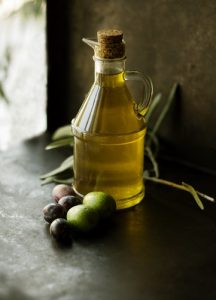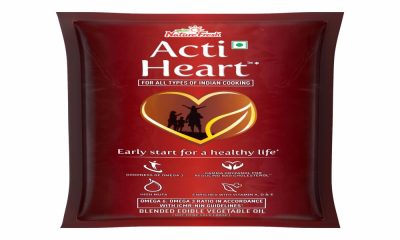General
The Difference Between Cold Pressed, Unrefined And Refined Oils
Oils are a vital part of our daily life. We use oils in foods, cosmetics, medicines and many more. A lot has been said about oils, its advantages, disadvantages, health benefits etc. There are literally hundreds of oils out there.
But do you know the difference between each type of oil?
Well, oils are primarily categorised based on their method of extraction.
So basically, there are three types of oil.
- Cold Pressed Oil
- Unrefined Oil
- Refined Oil
Let’s understand each category in detail
-
Cold Pressed Oils
Cold Pressed is a method of extracting oil by crushing seeds or nuts and forcing out the oil in them through pressure. The oil seed may include sunflower, canola, coconut to name a few.
Although a little amount of heat is generated due to friction, the oil is not subjected to any kind of external heat and consequently, the oil is known as Cold Pressed.
Cold pressed oils retain their nutritional value, flavor, aroma that are otherwise damaged by heat treatment. They contain anti-oxidants that help fight free radicals harming our body cells. Rich in Vitamins, most cold pressed oils have anti-inflammatory and healing properties. They are a good source of oleic acid that can help you boost your immune system and hence preferred as cooking oils. However, it is advisable to cook these oils on low heat since they lose their nutritional value once you expose them to high temperatures.
Olive oil, sesame oil, coconut oil, sunflower oil can be used for cooking, however, they should be limited to minimum use since they behave differently when exposed to high temperatures. Generally, it is advisable to use cold pressed oils in cooking because of their high nutritional content and due to their ability to provide rich flavor and aroma. But cooking with these oils is a bit tricky and you need to take calculated steps. Cold pressed oils don’t react well with heat and this is the reason why they are not extracted using heating techniques. Cold pressed oil contains a high level of unsaturated fats which degrades under high temperature making it unsuitable for consumption.
If you plan to switch to cold pressed oils, you must carefully choose appropriate oil based on your temperature requirements and make sure you are not heating them too much. It is advisable to use these oils to sprinkle on the already cooked food to enjoy the combination of health and flavor.
-
Unrefined Oils
Unrefined oils are oils exposed to minimal heat. They are not bleached or deodorized after extraction. Unrefined oils are most desired due to the presence of a good amount of nutrients which is true in its flavor and smell.
Unrefined oils are distinguished in three types, we have virgin oil, extra virgin oil and pure oil. The categorization is based on their method of extraction and the percentage of oleic acid present in them.
For example-
Olive oil is categorised based on the amount of oleic acid it contains.
- Extra virgin olive oil means it is the best quality oil from the first pressing containing only 1% oleic acid.
- Virgin olive oil is second best in quality. It also comes from the first pressing but contains a slightly higher amount of oleic acid (3%).
- Pure oil is the oil obtained from second pressing and also a mixture of oil released during the heat and chemical treatment. The oleic acid percentage ranges between 3-4%.
The drawback of unrefined oil is that it is less stable than refined oils. Means they have a short shelf life. Some unrefined oils may contain a strong smell which many people find unappealing.
-
Refined Oils
Refined oil is the product we obtain after refining crude oil by removing harmful materials. The refined edible oil has a great number of advantages over crude oil. It is clean, purer and more suitable for human consumption. The refined oil is stable, odorless, easy to store and produce less lamp black while cooking. Crude oil includes impurities like phospholipids, pigments, free radicals, off-flavor, triglyceride and non-glycerol all of which can prove fatal to human health.
Ways to obtain healthy refined oils
- Physically refined oils – Physical refining process includes degumming, bleaching and deodorization. It involves the removal of gum from oil through the process of degumming, a special method for removing FFA (free fatty acids) in the process of deodorization by steam. Physical treatment is more economical, requires fewer chemicals, produces less waste and gives higher oil yields. This method is highly preferred for oils having high levels of free acid and low levels of phospholipids.
- Chemically refined oils – Chemical method involves acid refining, alkali refining etc. This method is preferable for oils with high phospholipids and oil which contains gossypol that can only be removed by alkali treatment. First, the oil undergoes degumming process, a method to remove gum, seed particles, carbohydrates, proteins, traces of metals etc. It is then treated with sodium hydroxide, alkali solutions and other chemical solutions. Followed by bleaching and deodorization where unwanted flavors, smell and pigments are removed.
With various types of processes, machinery and equipment, all kinds of oils are refined from seeds like sunflower, groundnut, sesame, mustard etc.
Conclusion
With various types of oils available in the market, it is essential to know the type of oil you are consuming. Cold pressed and refined oils are high in nutritional content, but highly unstable at higher temperatures. On the other hand, refined oils are carefully treated oils making them suitable for daily consumption. They are more hygienic, with better health benefits and have a number of advantages over cold pressed oils.






















